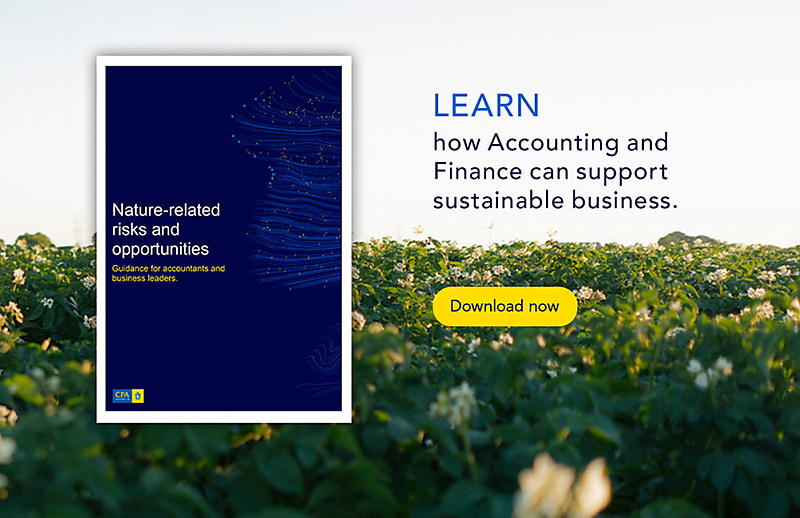26 June 2025
New Broker Academy 2025
Uncover a new world of opportunity at the New Broker Academy 2025If you’re ready for a career change and are looking...
KNOW MORE
In an era marked by increasing awareness of environmental issues, organisations are more attuned than ever to their dependence on nature and the associated risks and opportunities. Climate change, biodiversity loss, and resource depletion are not just environmental concerns; they are business imperatives that affect financial stability and long-term viability. Accountants, with their holistic view of organisational performance, are uniquely positioned to provide insights into these nature-related risks and opportunities.
Organisations are intricately linked to natural ecosystems. This connection manifests in various ways:
Resource Dependence: Many businesses rely on natural resources such as water, minerals, and agricultural products. For instance, a company in the food and beverage sector depends on agricultural output, which is vulnerable to climate change-induced variations in weather patterns.
Supply Chain Vulnerabilities: Natural disasters, such as floods and hurricanes, can disrupt supply chains, leading to increased costs and operational challenges. A disruption in the supply chain can affect not only the immediate availability of raw materials but also long-term supplier relationships and financial stability.
Regulatory Risks: Governments are increasingly implementing regulations to combat environmental degradation and climate change. Organisations that fail to comply with these regulations may face significant fines, legal actions, or operational restrictions. For example, carbon pricing mechanisms or emissions caps could affect the cost structure of carbon-intensive industries.
Reputational Risks: In the digital age, corporate reputation is critical. Companies perceived as neglecting environmental responsibilities may face public backlash, affecting their brand image and customer loyalty. This can result in lost sales, decreased market share, or increased costs related to reputation management.
Conversely, addressing nature-related issues can unlock significant opportunities for organisations:
Innovation and Competitive Advantage: Companies that invest in sustainable technologies and practices can gain a competitive edge. For example, a company that develops energy-efficient products or processes may reduce operational costs and appeal to a growing market segment of environmentally conscious consumers.
Cost Savings through Efficiency: Implementing resource-efficient practices can lead to substantial cost savings. Businesses that optimize their water and energy use, or minimize waste, can reduce operating expenses and improve their bottom line.
New Market Opportunities: The transition to a low-carbon economy opens new markets and investment opportunities. For instance, the renewable energy sector has seen significant growth, offering businesses opportunities to diversify their portfolios and engage in new revenue streams.
Enhanced Resilience: Organisations that proactively manage their environmental impact are better positioned to withstand and adapt to environmental changes. Building resilience through sustainable practices can safeguard against future disruptions and ensure long-term operational stability.
Accountants play a pivotal role in integrating nature-related risks and opportunities into the financial management and strategic planning of organisations. Their expertise in financial analysis, risk assessment, and strategic forecasting equips them to provide holistic thinking in the following ways:
Quantifying Risks and Opportunities: Accountants can develop frameworks to quantify nature-related risks and opportunities, translating environmental impacts into financial terms. This includes estimating the potential cost of environmental damage, compliance costs, or the financial benefits of sustainable practices.
Integrating Environmental Metrics: Incorporating environmental metrics into financial reporting helps organisations track and manage their ecological footprint. Accountants can ensure that sustainability metrics are included in annual reports, allowing stakeholders to assess the company's environmental performance alongside financial results.
Strategic Decision-Making: By providing insights into the financial implications of environmental decisions, accountants aid in strategic planning. For instance, they can assess the return on investment for sustainability initiatives or evaluate the financial impact of regulatory compliance.
Risk Management: Accountants are adept at identifying and mitigating risks. They can develop risk management strategies that incorporate nature-related risks, such as environmental liabilities or supply chain vulnerabilities, into the overall risk management framework.
Reporting and Disclosure: Accountants can guide organizations in meeting regulatory and voluntary disclosure requirements related to environmental impact. This includes adhering to standards like the Global Reporting Initiative (GRI) or the Task Force on Climate-related Financial Disclosures (TCFD), which provide frameworks for reporting on climate-related risks and opportunities.
Stakeholder Communication: Effective communication with stakeholders is crucial. Accountants can help craft transparent and accurate reports that address nature-related concerns, enhancing trust and demonstrating the organisation’s commitment to sustainability.
Nature-related risks and opportunities are integral to modern business strategy. As organisations navigate the complexities of environmental impact, accountants and finance executives are uniquely positioned to offer valuable insights through their comprehensive understanding of financial and operational dynamics. By integrating nature-related considerations into financial planning and reporting, accountants can help organisations not only mitigate risks but also capitalize on opportunities, ensuring long-term sustainability and resilience in an increasingly eco-conscious world.
CPA Australia has developed a guidance document that explores an organisation's dependence on and impact on nature. It highlights the critical role accountants play in providing holistic insights and solutions.
Titled “Nature-related risks and opportunities”, this guidance document is part of a content series that helps CPA Australia members to assist their employers when approaching sustainability issues. Learn more about:
the current policy landscape
business climate risks
aligning to climate goals
nature-related dependencies and risks
key considerations for business leaders.
Uncover a new world of opportunity at the New Broker Academy 2025If you’re ready for a career change and are looking...
KNOW MOREGet breaking news
 Login
Login

You are not authorised to post comments.
Comments will undergo moderation before they get published.